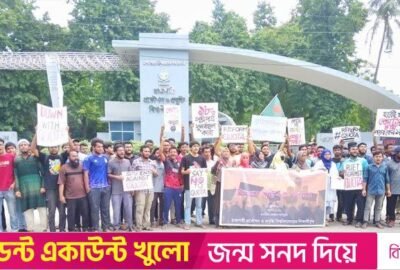



I started writing this series when my college teacher Samarendra Nath Poddar sir passed away. Since then, many people have joined the march. The number of people who know me directly is not very small. Rabbi Mama, Khalu, Sharif Sir, Karta, Fupu died one by one. And yesterday, Kakima died early in the morning Bangladesh time. The death march is lengthening with time. I wrote separately after the death of Karta but no more about the rest.
Actually, I don’t like to write tragic stories. But if I could write, maybe my mind would be lighter. Ever since hearing the news of Kakima’s death yesterday, a huge stone has accumulated on my mind. So I thought to try to get that stone off my mind by writing. The interesting thing is that the people I am talking about are not my blood relatives but they were my soul mates. They were all my relatives about the village. What is more interesting is that there are two types of people among them, Hindus and Muslims.
Rabbi Mama’s death was as sudden as a thunderbolt. A very premature death. Just when Rabbi Mama, who had just passed from childhood to adolescence, was beginning to see a little bit of life in his mind, Rabbi Mama died due to an accident. Rabbi Mama was a wonderful man. Not only me but everyone in the neighborhood says this. Rabbi Mamad’s house is just east of our house. Although I used to say uncle but actually he was our nephew about the neighborhood. His grandmother Sukhjan is known by everyone in our neighborhood and even the village as a very outgoing lady.

In fact, life’s setbacks made him like this. We call him Phupu. Although the name is Sukhjan, there was no drop of happiness in the life of Phupur. Her elder daughter Halima Khatun but we used to call her Hale Bu. Happiness was not written on his forehead either. Her husband is an eccentric man we read about in stories and poems. His first daughter is Hira Khalamani. Rabbi Mama was born much later.
Time and the flow of the river stand still for no one. Rabbi Mamao continued to grow with the times. The most amazing thing is that he continues to grow up with a mentality that is completely different from that family. The ever-cheerful Rabbi Mama became everyone’s favorite as he grew older. Everyone loved him for his cheerful and friendly nature. By that time, I crossed the college barrier and came to Dhaka and enrolled in the university. Kushtia leaves when she gets leave. And when I went to Kushtia, I used to play cricket with all the children of the neighboring houses behind our house with bats made of almonds and coconuts.
In Kushtia region we call grapefruit as nut and branch of coconut tree as bagu. My biggest allies in this game are Alamin Bhai and Rabbi Mama. The two of them used to collect nuts from under the grapefruit tree on their own. And they used to cut bagu from a small coconut tree. Then I used to shape it like a cricket bat.
He would selflessly come forward for any need of his neighbors. We three brothers could never stay at home to earn a living. So mother used to turn to Rabbi uncle for any need. And he used to do those things very soon. At least once when I called home, the topic of Rabbi uncle would come up. I used to see Rabbi Mama do no tricks in the game which in our area is called kaintami.

That’s how he became my favorite too. Then time started to pass. He began to grow like the green leaves of a banana tree. We all thought that maybe this time real happiness will come to Sukhjan Phupur’s family. But that dream was not fulfilled. He was suddenly electrocuted and died. I was deeply saddened by the pain of losing a close relative. In fact, everyone in the village is related. They quarreled in the morning and reconciled in the afternoon. Everyone is like a close family.
Khalu is my friend Salam’s father. How many memories with Khalu are crowding in the window of the mind. The only television in our neighborhood was in their house. National brand fourteen inch black and white TV. Although the TV was black and white, our youth was colored. We used to go to their house seven days a week. In this way our entire program was memorized.
Also Jagti rented VCRs from Railgate but they were played on TV. Then the TV was taken out of the house and placed on the balcony. Aunt didn’t complain much about watching programs during the day or before ten at night, but she didn’t want to keep the TV on after ten o’clock English news. Of course, he had his reasons. They used to sleep in that room.
It is difficult to fall asleep to the sound of the TV. But Khalu was in our team. He would turn off the lights in the room and turn down the TV volume. English serials started only if you somehow managed to get through the half hour of English news at 10 o’clock. I still remember staying up late watching the Hercules series. Since then I know how my name has become Hercules. Even today, Khalu is remembered when his friends call him Hercules when he returns to the village.
Whatever I write about Sharif sir will not be enough. He turned my life around on his own initiative. I was supposed to be a day laborer but now I am an engineer. I wrote an article titled ‘Alor Dishari’ about how he changed my life. That Sharif Sir died due to Corona. Sir was quite well even after being infected with Corona. But soon his situation started to deteriorate.
He was then admitted to Kushtia Sadar Hospital. If he had been given oxygen at the right time, he might still be alive among us today. He who was a beacon of light to many others like me eventually became a permanent resident of the dark world of the grave due to lack of oxygen. I sometimes think that if I had stayed in the country, I could have exerted my influence and perhaps procured oxygen for him on an urgent basis.
So sir, maybe he would have called me today and said, Kiram is in Bapur? I haven’t talked to you for a long time.
When we came and started living in Garadi due to the erosion of the Padma river, not everyone accepted us equally. But some people adopted us from the very beginning. My uncle and aunt were one of them. We had no prior acquaintance with Fupu.
Read more
- In Greece, two expatriate businessmen are accused of stealing one and a half million rupees
- Sydney’s Heavenly Bush Walk
While traveling to the uncle’s house, a relationship has developed. Fupa was a huge banana plantation. He used to cut raw bananas from the garden and ripen them at home. Then he used to supply to different shops. If we ever went to his house at that time, Phupu would definitely give us a stick of banana. Kushtia Zilla School got the seat for secondary examination.

I was worried about how to come and go. Knowing this, Fupu called his table boy Latif Bhai and said, you will take Yakub to the exam hall and bring him back when the exam is over. He would have done the same even if he had a cousin of my blood relation. Every time I went to Kushtia from outside I used to meet him. As soon as he met, he was busy thinking how to take care of him.
Kakima was my friend Vidyut’s mother but also another mother to me. It is my habit to walk around the neighborhood to brush my teeth with toothpicks in the morning when I go home. Going to the uncle’s house and standing next to the stove, you will get a peek at what is being cooked there. It was part of the regular routine to go to the kalpad and wash the face after cooking something delicious. Even if we don’t eat anything, at least the tea will be consumed because we don’t have the ability to make tea in the morning at home.
Even after coming to Australia, Kakima was spoken to at regular intervals. The first day I called him, he asked what time it was. I said eight o’clock. He was very surprised to hear because it was only four in the afternoon in Bangladesh. In fact, our Atpaure mothers have such genuine simple minds. After going to the country and not playing the Luchi Labra of Kakima’s hands, it seemed that something important had been left out. Recently, Kakima was diagnosed with cancer in her uterus. After that treatment, he was fine for a few days. But in the end he couldn’t stand it anymore.
I got the news of Kakima’s death from another friend of mine, Salam. I said to Salam, I now know why I think I could have done without studying so much. If I had mastered the village school with a small degree, I could have at least stayed close to my father and mother. I could take care of them. But now there is nothing else to do but to sit in this far-away place and hear about the loss of relatives of the people of the country.

In the context of the conversation, I said, let’s see the aunt. Aunty looked as if she was withered and shortened. Salam said after hearing that, mother’s waist hurts so she walks hunched over. I said, “Khalu has left, now Kakima has gone.” After that, I will hear that my father and mother are also passing that way. And I am sitting on the banks of seven seas ter river crying dumbly and shedding tears in silence.
Even if there is social and economic security in the life of the expatriate, relatives take Om. At this age, we understand that emotional hunger is our basic need like physical hunger. Our emotional aspects are fully developed through contact with relatives. Being alone may be financially beneficial but mentally cripples us. I understand this by seeing the second generation of immigrants.
No matter how much we teach them caring or sharing, they eventually grow up like an isolated island. Their common saying is, I’m bored. It bothers me a lot but I don’t always see a way out of it. Here all the basic needs of life are fulfilled by the state so there is no separate joy in their life. The same monotonous life as the week, month and year.
We grew up in the country with the genuine kindness of all the people in the neighborhood. Although these people are not related by blood, they are all my soul mates. I learned to get along with all of them. The tension of these people is also a part of my life. Again I learned to be happy with the happiness of these people. There was very little preference for personal wants and desires.
So our life never became monotonous. I have told my children, as soon as you turn eighteen, I will leave the country and spend the rest of my life with my own parents. I don’t know if it will be possible. As long as I can’t go, I have to cry dumbly for the people of the country.
MRM/ASM






